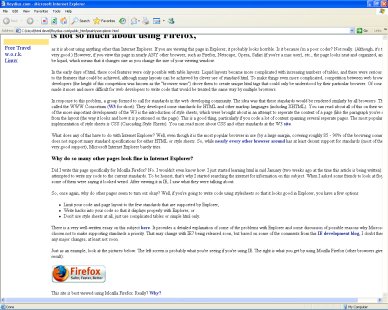Its not so much about using Firefox,
as it is about using anything other than Internet Explorer. Before we start, let me say that none of the content here even touches IE's security problems. This is mostly because my knowledge of these issues is sparse, at best. Look it up though -- search google for "internet explorer" and "security" -- see what I mean? That having been said, let's move on.
If you are viewing this page in Explorer, it probably looks horrible. Is it because i'm a poor coder? Not really. (Although, it's true, I'm not very good.) However, if you view this page in nearly ANY other browser, such as Firefox, Netscape, Opera, Safari (if you're a mac user), etc., the page looks neat and organized, and it should be liquid, which means that it changes size as you change the size of your viewing window.
In the early days of html, these cool features were only possible with table layouts. Liquid layouts became more complicated with increasing numbers of tables, and there were serious limitations to the features that could be achieved, although many layouts can be achieved by clever use of standard html. To make things even more complicated, competition between web browser developers (the height of this competition was known as the "browser wars") drove them to create unique html tags that could only be understood by their particular browser. Of course, this made it more and more difficult for web developers to write code that would be treated the same way by multiple browsers.
In response to this problem, a group formed to call for standards in the web developing community. The idea was that these standards would be rendered similarly by all browsers. This group is called the WWW Consortium (W3 for short). They developed some standards for HTML and other markup languages (including XHTML). You can read about all of this on their website. One of the more important developments of the W3 is the introduction of style sheets, which were brought about in an attempt to seperate the content of a page (like the paragraph you're reading) from the layout (the way it looks and how it is positioned on the page). This is a good thing, particularly if you code a lot of content spanning several seperate pages. The most popular implementation of style sheets is CSS (Cascading Style Sheets). You can read more about CSS and other standards at the W3 site.
What does any of this have to do with Internet Explorer? Well, even though it is the most popular browser in use (by a large margin, covering roughly 85 - 90% of the browsing community), it does not support many standard specifications for either HTML or style sheets. So, while nearly every other browser around has at least decent support for standards (most of them have very good support), Microsoft Internet Explorer barely tries.
Why do so many other pages look fine in Internet Explorer?
Did I write this page specifically for Mozilla Firefox? No. I wouldn't even know how. I just started learning html in mid January (two weeks ago at the time this article is being written). I've only attempted to write my code to the current standards. To be honest, that's why I started searching the internet for information on this subject. When I asked some friends to look at floydius.com, some of them were saying it looked weird. After viewing it in IE, I saw what they were talking about. Just as an example, look at the pictures below. The first screen is probably what you're seeing if you're using IE. The second is what you get by using Mozilla Firefox (other browsers give a similar result). Click the image for a larger view:
So, once again, why do other pages seem to turn out okay? Well, if you're going to write code using stylesheets so that it looks good in Explorer, you have a few options:
- Limit your code and page layout to the few standards that are supported by Explorer,
- Write hacks into your code so that it displays properly with Explorer, or
- Don't use style sheets at all, just use complicated tables or simple html only.
There is a very well-written essay on this subject here. It provides a detailed explanation of some of the problems with Explorer and some discussion of possible reasons why Microsoft has chosen not to make supporting standards a priority. That may change with IE7 being released soon, but based on some of the comments from this IE development blog, I doubt there will be any major changes, at least not soon.
Will I be changing my code to look better in Explorer?
The short answer is, no. Why?
- I barely know how to write clean code that is up to standards as it is. I don't know enough to write hacks for Explorer, nor do I have the time to learn how.
- It doesn't make any sense. The only people who are really worried about Explorer are businesses or institutions who know that 90%
of the public uses IE. They believe that if their site doesn't look good in IE, people will think they are unprofessional.
When television signals started supporting color over simple black and white, the television manufacturers made TVs to support it because it was better! If a company decided to stick with black and white, they wouldn't be around anymore. TV stations wouldn't say, "well, the most popular TVs refuse to support color, so we're just going to broadcast in black and white. Too bad, it was a good idea..." For some reason, this is how web developers have reacted to Explorer, and so as long as the viewing public doesn't notice a difference, why would they change? - If more developers refuse to bend over backwards to support IE, it might cause them to change. When everyone develops for them, they really have no reason to change. A trend of this nature could actually be good for Microsoft, because it would force them to improve. With my millions upon millions of viewers, I'm sure my site in and of itself will turn the tide! *cough*
Why Firefox?
Mozilla Firefox is my personal favorite because it is not bloated with features or toolbars that I don't want. It supports standards beautifully and is quickly becoming more popular even among the general population. Tabbed browsing is great, and once you get spoiled by it, you will not want to go back. (IE7 will support tabbed browsing, at least.) Many other browsers offer these features and more, so look around and find what suits you best. If you do want to try out Firefox, you can download it here.
If you decide to stay with IE, you can still view my content here. But, switching to firefox (or some other browsers) will afford you a much richer and safer experience on floydius.com and many other pages online.

